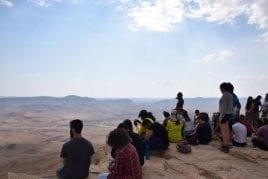
I don’t think I will ever forget waking up in the middle of the night under a Bedouin tent to have the rare experience of watching the stars in the unpolluted sky of the Negev. The night was peaceful, and the fresh air was crispy cold, and with a single blanket, I lay looking up at my new star-filled bedroom ceiling which was much different from the city life. Besides having the feeling of a whole body restoration process, I could hear the rasping, grunting sounds of the camels in a close distance while still mesmerized by my timely shooting stars experience. At one point, my mind started wandering and recounting how our journey to the Negev began with the setback of traveling an extra two hours because of the flash floods that made us skip the hiking activity scheduled for today. However, this simple natural drawback didn’t limit our experience of fun and interaction with nature at its best. We had an amazing, once in a lifetime opportunity to view the Makhtesh in Mitzpe Ramon, meet with two of the best scientists in the region, ecologist Dr. Elli Groner and geologist Dr. Yaron Finzi, and learn more about urban settlement in the Negev from our tourguide Yoash Limon. In addition to enjoying a grand home hospitality lunch with a local women social initiative, our visit to the unrecognized Bedouin village where to learn more about the Bedouin culture and the creation of ecological community was mind-blowing. Seeing all the students going out of their way to helping set up the campfire, serve tea, play with the local kids, smiling and laughing with each other, was worth every single second of pain and sweat and ended the day on a good note.
After a communal breakfast the next morning, my expectations were high, and our second day began with a visit to the Ashalim solar power plant, which is considered one of the prevalent renewable energy developments in the world. Still fascinated with the power of the thermo-solar tower that uses mirrors to concentrate solar heat, our next stop was in Sde Boqer were we meet Dr. Asaf Tsohar to discuss and share our experiences regarding the challenges of conservation in the Negev. We then met with Eve Tendler from the Negev Coexistence Forum. Eve, an Arava Institute alumna focused her talk on issues affecting the Bedouin communities.
After dinner at the Holot Makman family farm, we spent the better part of the night around the bonfire, talking, and sipping mint tea. After a short and peaceful night’s sleep, I rolled out of my sleeping bag to the sound of our Program Associates announcing that it was time for breakfast and meeting with our host family on the farm. Our acquaintance with the family began with the remarkable story of how the farm was set up and the challenges they faced as an Israeli family living next to the Bedouin community before learning to live in peaceful co-existence with each other. We explored different sections of the farm where we learned about making biodiesel, biogas systems, and tips on ecological lifestyle techniques. When the trip came to and end, I couldn’t help but realize that without the diversity of the student and staff community made up of Israelis, Palestinians, Jordanians and internationals, the Negev trip would not have been this outstanding and magical.
Submitted by Joseph Mufutu, Fall 2018 student from Kenya

